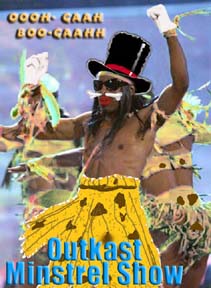 A response to the Stereotype of the Month entry on the OutKast outrage:
A response to the Stereotype of the Month entry on the OutKast outrage:
 A response to the Stereotype of the Month entry on the OutKast outrage:
A response to the Stereotype of the Month entry on the OutKast outrage:
>> Native Americans have no sense of humor. <<
Says the woman who protests whenever someone makes fun of hockey players.
>> They also need to learn to separate entertainment from reality. <<
No, you need to learn where people's misunderstandings and misperceptions come from. If not from the media, then where?
>> Ummmm, from their parents? Most kids learn prejudice & stereotypes from their family, long before the mass media gets its full grip on them. <<
Au contraire. Today's toddlers watch cartoon shows and videos almost from birth. If they're learning about Indians, they're learning about them from Pocahontas and Peter Pan. As they get older, they segue into old Western movies, comic books, and of course Grammy performances.
In contrast, people (whether parents or otherwise) almost never mention Indians in casual conversation. If I didn't instigate the topic, I'm betting most of the people I know could go their entire lives without discussing Indians.
I'm guessing school instruction would be the second biggest source of information after the media. Parents might be a distant third.
Parents may instill a general attitude toward people of other races, but we're talking about where people get their knowledge, not their feelings. You can be openminded and unprejudiced about a minority but still be ignorant or misinformed about them. In general, people stereotype others because they don't know any better, not because they feel antagonistic or malicious.
No need to take my word for this. I've quoted several experts who say stereotyping is the media's fault. I'll go with their opinion on the matter.
The debate continues (8/20/04)....
>> So we can extrapolate from this that before there was mass media, there were no stereotypes? <<
There has always been media, if not mass media. The Bible is one huge media influence on Western civilization. More recently and to the point, America gained much of its notion of Indians from Wild West shows, romanticized paintings, and dime novels. (See A Brief History of Native Stereotyping for more on the subject.)
Before the advent of printing, people got their news from traveling salesmen, town criers, the church pulpit, or the rumor mill. They didn't just sit around listening to family members. So the sources for stereotypes go far beyond "parents," which was your claim.
Parents (and friends, and neighbors) may have been the primary source a few hundred years ago—say, before the Industrial Revolution. But since the advent of technology such as trains and the telegraph, news (and stereotyping) has traveled fairly quickly.
Another flaw in your argument: Unlike the generic stranger or foreigner, Indians haven't been around forever. They came into the European consciousness at a particular moment in time: 1492. Before then, Indian stereotypes didn't exist because, as far as Europeans knew, Indians didn't exist.
You say children learn Native stereotypes from their parents? Okay, so where do the parents learn Native stereotypes from? Their parents?
Nice try, but at some point this line of reasoning fails. If you were old enough to understand Native stereotypes in 1492, I can guarantee you didn't learn them from your parents. You (and your parents, if they were still alive) learned these stereotypes from something or someone else.
Since parents definitely weren't the source of the first Native stereotypes, what do you think was the source? And why wouldn't this source have continued to be the source down through the years? Why isn't it still the source today?
Rob
|
. . . |

|
All material © copyright its original owners, except where noted.
Original text and pictures © copyright 2007 by Robert Schmidt.
Copyrighted material is posted under the Fair Use provision of the Copyright Act,
which allows copying for nonprofit educational uses including criticism and commentary.
Comments sent to the publisher become the property of Blue Corn Comics
and may be used in other postings without permission.